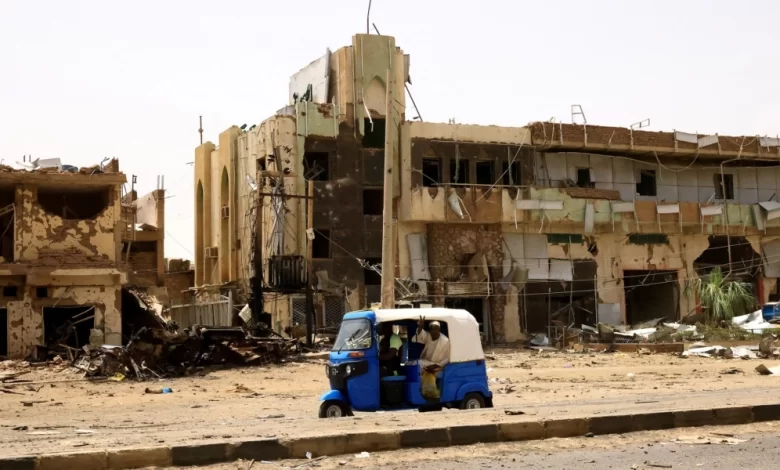Dozens of officers surrender after the Rapid Support Forces tightened their siege on the army headquarters

The Rapid Support Forces led by Lieutenant General Mohamed Hamdan “Hemeti” imposed a tight siege on the headquarters of the Sudanese Army, which led to the surrender of dozens of its high-ranking commanders, indicating that they are approaching the end of the battle in their favor.
These developments come as indirect negotiations continue in Jeddah between representatives of the two commanders of the army and the rapid support forces, at a joint US-Saudi initiative on which the Sudanese pinpoint high hopes to end the fighting that has claimed the lives of hundreds. A Saudi diplomatic source stated that it has not achieved major progress so far.
The Rapid Support Forces announced in a statement posted on its Facebook page that “130 elements who were inside the Sudanese Army General Command have surrendered,” noting that they “admitted to a total collapse of the forces in the General Command and that they are all looking for a safe exit.” It noted that they “confessed to committing atrocities by carrying out physical liquidation of all those trying to escape the siege and shackling large numbers of them in chains.”
“Sudan’s army commander, Abdul Fattah al-Burhan, is believed to be among those trapped inside the headquarters, but there have been no precise details since the conflict erupted.” Previous army statements indicated that his commander was directing the battle from the headquarters.
The Sudanese army said in a statement on Monday that it is “fighting a battle for dignity and dignity to end the rebellion”, calling on citizens to stay away from areas of clashes, and accusing the Rapid Support Forces of “using citizens as human shields to take shelter in residential neighborhoods and health facilities”.
The statement urged citizens to “avoid areas of clashes as much as possible and to avoid dealing with weapons, ammunition and remnants of war”.
In response to a Saudi-American initiative, the two military commanders sent representatives to Jeddah on Saturday for talks that Washington and Riyadh described as “preliminary talks.”
A Saudi diplomat told AFP: “So far the negotiations have not made much progress,” adding: “A permanent ceasefire is not on the table. Each side thinks it can resolve the battle.”
Fierce clashes erupted between the army and rapid support in the Shambat and Halfaya districts of Bahri city, north of Khartoum, witnesses said, adding that strong explosions were heard in these areas as well as the sound of heavy weapons, overhead of military aircraft and anti-aircraft fire.
For the fourth consecutive week, Khartoum’s five million residents have stayed home amid a lack of water and food resources amid panic and confusion from stray bullets.
The Sudanese military said earlier that its delegation to the negotiations “will only talk about the truce and how it can be implemented properly to facilitate humanitarian access.”
UN humanitarian chief Martin Griffiths arrived in Jeddah on Sunday to try to meet representatives of the warring parties but his role in the negotiations has so far been unclear.
A spokeswoman for Griffiths said on Sunday that he was seeking to discuss humanitarian issues relating to Sudan, while a second UN official told AFP that the UN official had “requested to join the negotiations”, adding that his request had not yet been approved.
The UN Human Rights Council is to meet on 11 May to discuss the impact of the fighting in Sudan on human rights, with experts believing the war could drag on and neither side is able to resolve it on the ground.
According to the website and facts of the armed conflict, 750 people have been killed and 5,000 wounded in the more than three weeks of fighting. In addition, 335,000 people have been displaced and 117,000 have sought refuge in neighboring countries.
Egyptian Foreign Minister Sameh Shoukry said that Egypt has received “since the beginning of the crisis more than 57,000 of its Sudanese brothers, in addition to its contribution to the evacuation of more than 4,000 foreign citizens.” Meanwhile, the United Nations reported that 30,000 Sudanese have fled to Chad and 27,000 to South Sudan, and more than 90% of them were from South Sudan. UNHCR says the real figure is probably much higher.
“Aid agencies fear the refugee influx could exacerbate an already dire humanitarian crisis in South Sudan, which has more than two million displaced and three-quarters of its 11 million population in need of aid.”
The Jeddah talks follow a series of regional and African initiatives, led by Eastern countries and the African Development Community (IGAD), that have yet to bear fruit.
The AU is also seeking to mediate between the two sides, especially as it has used up the last card to put pressure on Sudan to suspend its membership in 2021 after it carried out a military coup that ousted civilians from power.












